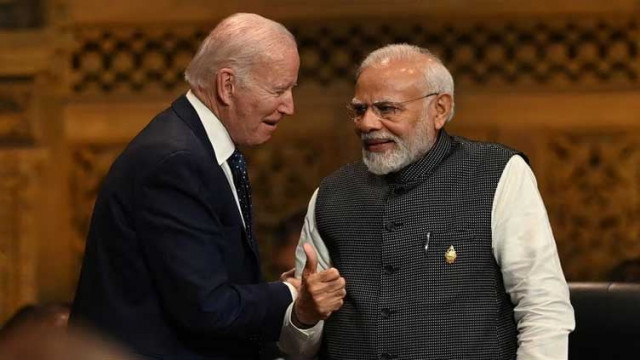Pakistan vows to counter Indo-US defense ties
Islamabad says high-end military transfers pose security threat

Pakistan has conveyed its strong reservations to the US for its deepening defence cooperation with India, viewing the development as a direct threat to the country’s security interests.
Official sources told The Express Tribune on Thursday that the US was informed through diplomatic channels that the transfer of advanced military hardware to India without taking into account Pakistan’s legitimate concerns would undermine the strategic stability and conventional balance in the South Asian region.
Pakistan told the US that India would feel embolden with the acquisitions of the technologies, thus putting the country’s national security interests in jeopardy, according to the sources familiar with the development.
Islamabad made it clear to Washington that such a cooperation between India and the US that harms its interests will leave Pakistan with no other option but to go for counter measures.
When Indian Prime Minister Narendra Modi recently visited the United States on a first state visit, his trip was not only rich in optics but some substantive decisions were taken.
For example, General Electric and India's state-owned Hindustan Aeronautics Limited will make in India advanced fighter jet engines for the country's indigenous light combat aircraft.
The US also agreed to set up a facility in India to produce battle-tested armed drones. For decades, Russia remained the major supplier of arms to India with 65 percent share only a few years ago.
That has now come down to 45% while the US share has jumped from 1 per cent to 11 per cent. The other major decision taken during Modi's visit was that the US memory chip giant, Micron Technology, will invest up to $825 million to build a semiconductor assembly and test facility in India, creating thousands of jobs.
This indicates that the US is not only willing to sell arms to India but is not averse to the idea of transferring technology, something that has already raised alarm bells in Pakistan.
The US arms sale and transfer of technologies to India may be aimed at China but the development will certainly upset the military balance in South Asia.
Pakistan feels that the deepening US-India defense ties is a direct threat to its national security. "Such steps are accentuating the military imbalance in the region and undermining strategic stability. They remain unhelpful in achieving the objective of a durable peace in South Asia," read a statement of the Foreign Office while reacting to the Indo-US defense deals.
The US is certainly not bothered much as it is looking to achieve the bigger objective -- to tame China. In fact, just a day after Modi wrapped up his visit to the US, the Indian army violated the ceasefire along the Line of Control (LoC). This was the first known transgression since the two countries agreed to renew the truce in February 2021.
The statement issued by Inter-Services Public Relations (ISPR) indicated that the Indian move was linked to its burgeoning defense ties with the US. “Driven by a new found geo-political patronage, India forces have embarked on a plan to take innocent lives to satiate their false narratives and concocted allegations.”
Islamabad was also perturbed with the Indo-US joint statement where a specific reference was made to Pakistan. The joint statement accused Pakistan of cross border terrorism and use of terrorist proxies. Pakistan strongly rebutted the charges and found them as unwarranted, one sided and misleading.
The US Deputy Chief of Mission was called to the Ministry of Foreign Affairs and a demarche was made to him regarding the US-India Joint Statement, issued on 22 June.
Pakistan’s concerns and disappointment at the unwarranted, one-sided and misleading references to it in the Joint Statement were conveyed to the US side.
It was stressed that the United States should refrain from issuing statements that may be construed as an encouragement of India’s baseless and politically motivated narrative against Pakistan.
It was also emphasized that counter-terrorism co-operation between Pakistan and US had been progressing well and that an enabling environment, centered around trust and understanding, was imperative to further solidifying Pakistan-US ties.


















COMMENTS
Comments are moderated and generally will be posted if they are on-topic and not abusive.
For more information, please see our Comments FAQ